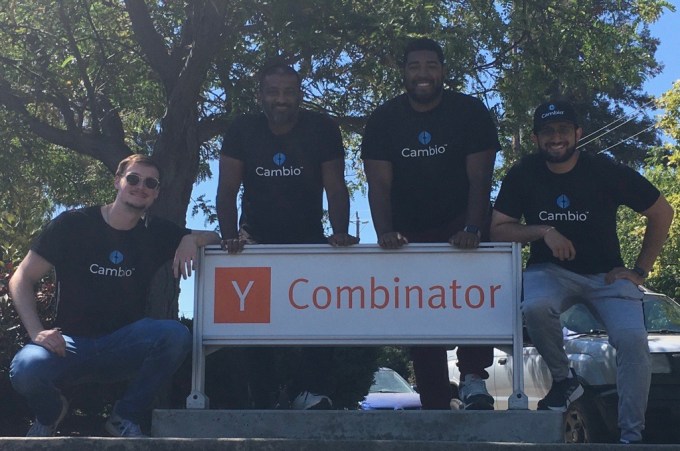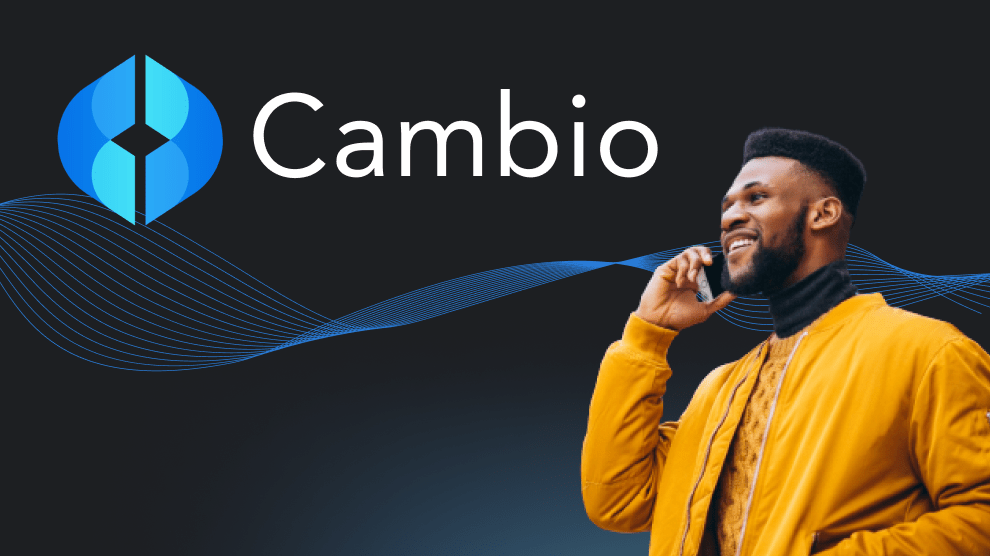A Y Combinator-backed startup called Cambio is bringing AI to the banking world in a surprising way: It’s putting AI bots on the phone with companies and consumers. The startup began by offering an AI-powered service that negotiated debt collections on behalf of consumers, which helped around 70% of customers resolve their collections and raise their credit score, it says. Now, Cambio is taking that technology to banks and credit unions as an API that can assist them with sales calls.
Cambio hails from Blesson Abraham (CEO), an entrepreneur with a background in banking. Previously, Abraham was the co-founder and CEO of SavvyIntel, a SaaS analytics solution for credit unions, which was acquired in 2017 by TruStage. After the exit, Abraham came up with the idea to help people who were struggling to improve their finances with a banking app — something he understood personally, as he went into debt when initially founding his last startup.
“I came out of it on top, but there’s one in three U.S. adults who have struggles like that,” he explains. “So we built Cambio with that premise.”
When it was created in 2021, Cambio was envisioned as a neobank aimed at this underserved market. However, Abraham found that Cambio’s users were more interested in its tools for building better credit habits. After the startup was accepted into the Y Combinator accelerator in 2022, the team decided to rebuild the app and pivot to reflect its new focus of helping consumers get out of debt.
Over the past year, Cambio’s service has reached nearly 90,000 users and the app’s business model shifted from freemium to paid.

One of its newer features was prompted by the popularity of ChatGPT. Customers were asking Cambio if it could help them resolve their collections debt.
“With ChatGPT, one of the cool things was we could actually coach people in real-time as they were talking to their collectors,” says Abraham. “So we came out with a solution within our app where you would call your collector, our bots would listen in on the call, and tell you in real-time what to say back to them.”
The founder says this was permitted because the calls were already being recorded by the debt collectors, so it was not a problem for an AI to “listen in.”
That experience then led to customers asking Cambio if it could just handle the calls on their behalf and negotiate the debt down for them. The company realized it could do so by first getting a signed power of attorney and then calling the collectors using AI.
“We started off very, very safe — people who wanted to pay off their full amount [of debt] — who wanted the item to come off their collection report,” Abraham says.
Cambio found initial success going this route, as seven out of 10 customers improved their credit scores within 60 days of placing the call with the AI bots.
Cambio’s AI bots will tell the collector who they’re calling on behalf of and when the collector asks for proof, they send out the power of attorney paperwork via email. Because the calls focused on a simple use case — paying off the debt in full — it was relatively easy to keep the conversation within the guardrails of that negotiation.
That’s not to say there weren’t struggles at first. Abraham says that, initially, Cambio had to deal with AI hallucinations, but this got better over time as more calls were made.
Cambio’s ability to manage debt collection calls soon led the company to its next idea: an AI, called AviaryAI, that can be used by banks and credit unions to call their customers. This technology puts AI to use to help with the sales and outreach calls that banks use to help cross-sell products to their customers, like alerting them to a new checking account product, credit card, debt protection service and more.
Although the FCC recently declared AI-initiated robocalls illegal, Cambio believes its AI bots will be permitted. The company also consults with legal counsel on the nature of its bots and the applicable laws.
“Banks, credit unions and even our first set of clients are actually insurance companies — I picked the trifecta of highly regulated industries,” Abraham points out. He says the company is also trying to work with regulators by proactively presenting its technology to them and explaining how it’s built, how the bots reach out and what the bots can and cannot do.
“When we make these phone calls, we let people know you’re talking to a virtual assistant,” he says. “It’s not as simple as just…putting a voice over an LLM and people are listening to it.”
The calls can start the conversation with the customer, but can also bounce out to a real person, if desired. The AI-driven calls have just as much success as calls placed by the sales teams, where around 5-10% of calls are picked up, Cambio claims.
“If you were to compare it to a human being, we’re actually matching that or, if not, in certain use cases, even better,” Abraham says.
The experience today involves three different bots: one that places the call, another observing that bot to make sure there’s no escalation needed and a third bot that monitors the entirety of the call, to analyze things like the tonality, what the customer said and so on — essentially offering a quality control perspective on the call’s effectiveness.
The technology is being trialed by a handful of early adopters, including Envisant, Encurage Financial Network, Agenium and Skyla Credit Union.
With the move into the B2B space, the Cambio app for consumers isn’t going away, but the company may focus its monetization efforts on the API.
To support its growth, Cambio has also raised a $3 million seed round of funding from Builders, DVC, EGR Partners, Envisant, Encurage Financial Network, Goodwater Capital, Leonis Investissement, Sandhill Capital, YC and other angel investors.
“We at DVC are excited to back Cambio’s team on their mission to introduce much-needed technology into consumer financial products, aiming to create transparency and empower individuals to better manage debt and rebuild their credit scores,” said DVC Managing Partner Marina Davidova. “They demonstrate not only a clear vision but also the ability to relentlessly execute on it, building user-friendly solutions powered by sophisticated AI.”































Comment